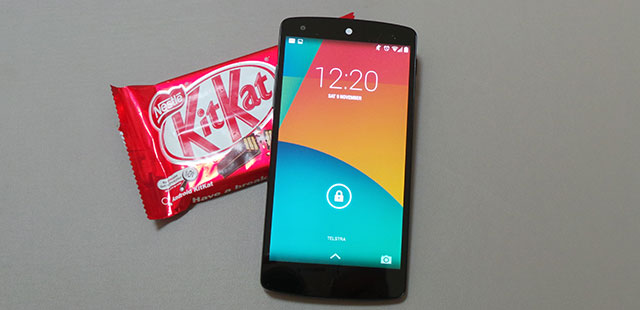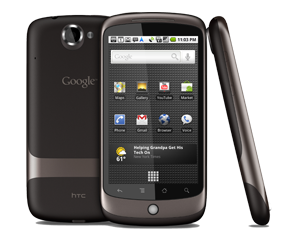
The Nexus program has been a curious exercise on Google’s behalf, allowing us to see examples of Android done very well, and sadly in some instances, not so well.
Those who’ve been around Android for awhile will remember the much hyped Nexus One, which really set the benchmark for what an Android phone should – at the time – have been. It used the same internals as the HTC Desire, one of the most popular Android handsets of its time, but presented a very plain, unchanged view of Android. HTC added Sense and other bits and pieces to its Desire; the Nexus One was Android, and nothing but.
The Nexus One was a fairly limited release, and was perhaps symbolic of what the Nexus program would mostly be; relatively niche devices, with a stock Android experience, that would not (with few exceptions) be sold via ordinary mass-market retail channels.
There were some poor examples on the way – the the Nexus S and Galaxy Nexus from Samsung were two such devices that just really weren’t much good – but generally speaking, the Nexus line of devices has been pretty impressive. This isn’t to say that there aren’t those who liked the Nexus S and Galaxy Nexus; many did.. but they certainly weren’t as groundbreaking they could (or should) have been.
The Nexus 7 is probably the real success story, both in its 2012 and 2013 incarnations. Initially a niche device like the rest of its brethren, it has successfully made the jump to fairly wide retail availability, and remains to date a fairly popular Android device. It’s powerful, affordable, and with few of the annoying quirks that plague other mid-range tablets.
However, it seems the time for the Nexus line might be drawing to a close. Blogger and Twitter user Eldar Murtazin, who has a fairly mixed record when it comes to leaks about Android and mobile, has claimed Google will close the Nexus program in 2015, after a few more releases in 2014:
Nexus line by Google is over in 2015 😉 Yes – this line will be replaced by Play Edition (current name, it will be rebranded)
— Eldar Murtazin (@eldarmurtazin) January 27, 2014
Eldar goes on to say that the program may be ending in name only, and may be replaced by the current trend towards manufacturers releasing Google Play Edition devices for sale through the Play Store instead.
Let’s unpack this rumour a bit and look at some other signs which might point in this direction.
What Google said about the Nexus One
 When the Nexus One was announced in January 2010, Google saw it as revolutionary on two fronts. One, it would be available exclusively through online channels, bypassing carriers and retailers and available for sale direct to the public. At the time, this was a huge thing in the US market (though somewhat less so elsewhere).
When the Nexus One was announced in January 2010, Google saw it as revolutionary on two fronts. One, it would be available exclusively through online channels, bypassing carriers and retailers and available for sale direct to the public. At the time, this was a huge thing in the US market (though somewhat less so elsewhere).
This is no small point, but there was another talking point as well: Google saw the Nexus One as epitomising the ‘superphone’, a way to raise the bar and set the standard for what a smartphone should be. This would be a message not just to consumers about Google’s vision, but a statement to manufacturers; here’s the line in the sand. Meet or exceed this.
This statement from Andy Rubin (then head of Android) really set our expectations for what the Nexus program was about.
Not only would it be powerful handsets sold directly by Google, but it would also set the standard at the time, and in future, for what Google saw Android as being.
The state of play in 2013/14
Fast forward a few years, and we’ve seen quite a few Nexus devices follow in the footsteps of the Nexus One: Nexus S, Galaxy Nexus, Nexuses 4, 5, 7 and 10. All have been available for purchase online, some have made the jump to brick-and-mortar retailers, some have even been sold by carriers, but one thing has remained constant. While they’ve been made by other manufacturers and white-labelled for Google, Google hasn’t made one of them. It’s presumably picked the best pitch from OEMs and asked them to make the product to be sold under the Nexus brand.

Good for Google, not quite so good for the OEMs.
However, 2013 saw a new way to get your hands on Android. We’ve had a few years of the Nexus program, we’ve also had a massive increase in the range of handsets available from OEMs through carriers, in store and basically via any sales channel you can imagine. However, despite this, and even despite the existence of the Nexus program, consumers seemingly wanted more.
The Nexus program was great, in that it offered stock Android on fairly powerful devices, but they all lacked something. The Nexus 4 inexplicably lacked LTE at a time when it was emerging and appearing on many more Android devices. The first Nexus 7 was a bit thick and a bit heavy, and the Nexus 10 was great, but lacked ‘wow’ factor.
In short, it seems, Google and the Android manufacturers came to the conclusion that people liked the stock Android option, but not so much the stock hardware option. The public liked the hardware coming from HTC, Samsung, and others, but wanted other options.
Samsung and HTC make great Android handsets, which run their modified versions of Android, but what if you wanted one of those handsets and stock Android? There were various unofficial, unsupported, and frankly some dangerous ways in which to achieve this, but none really had the feel that they’d become more mainstream.
The Google Play Edition
Roll on the Google Play Edition, which first saw releases from Samsung (in the form of a Galaxy S4 GPE) and HTC (One GPE). Just like the Nexus program, these were available exclusively through Google’s Play Store, ran stock Android updated by Google and not by OEMs, and were (except for the hardware) basically Nexus devices.
Relatively quickly, we saw releases from other manufacturers as well; Sony, LG, and Motorola have also joined in.
There is at lease one place where the GPE program (if we can call it that) diverges from the Nexus program, in that (for now) these GPE devices are only available in the US, but if we cast our minds back to the early days of the Nexus program, this was true then as it is now for GPE.
Is GPE the evolution of the Nexus program?
In short, all signs point to yes.
The Nexus program was undoubtedly strongly influenced by Andy Rubin, who wanted to show OEMs what Android could look like and how powerful it could be.
 Rubin, however, has moved on to other things, and Android is now under the stewardship of Sundar Pichai. Pichai, who initially oversaw the development of Chrome and Chrome OS, amongst other things, was an interesting choice to take over from Rubin, in that many predicted at the time it would herald some changes for Android, and a better integration into Google by pairing responsibility for Android with responsibility for broader, Google platform projects as well.
Rubin, however, has moved on to other things, and Android is now under the stewardship of Sundar Pichai. Pichai, who initially oversaw the development of Chrome and Chrome OS, amongst other things, was an interesting choice to take over from Rubin, in that many predicted at the time it would herald some changes for Android, and a better integration into Google by pairing responsibility for Android with responsibility for broader, Google platform projects as well.
If we look at Chrome OS as an example, then the end of the Nexus program could well be nigh. While Google makes Chrome OS, it doesn’t make (or brand) any of the hardware that runs it. Yes, Chromebooks are colloquially known as ‘Google Chromebooks’, but they aren’t sold or branded this way.
Rather, they’re known by the manufacturers who make them. The Acer C7, Samsung Chromebook, HP Chromebook 14 and Chromebook 11, the Acer C720.. the only exception is the Chromebook Pixel, but it’s not anywhere near as widely available as the rest of its brethren.
No, if we look at Chrome OS, then the Google Play Edition makes much more sense. Google builds the platform, and hands it over to OEMs to make and release hardware for it under their own banners. The HTC One GPE is not a Google device; it’s an HTC device through and through, that runs Google’s software as envisioned by Google.
Do we still need the Nexus program?
In 2014, is the Nexus program still relevant? Would it still be in a year’s time?
At the moment, I think it still as a place, but it’s days are numbered. We pose the hypothetical: Would we have purchased the Nexus 5 (made by LG) if the Samsung Galaxy S 4 / HTC One Google Play Editions were available for sale in Australia? For the editors at Ausdroid, the answer was yes.
This might simply be because the hardware in the Nexus 5 is a good six (or more) months newer than what’s in the HTC One and Galaxy S4, and we’ve each tried those devices and moved on before the Nexus 5 became available; buying back into those devices (albeit with GPE) would have been a step backwards, whereas the Nexus 5 wasn’t, though it wasn’t a huge step forwards, either.
Moving ahead, where GPE devices are being released either at the same time as the consumer-focused, Android-based devices with OEMs own interfaces on top, the demand for the Nexus program, and indeed the justification for keeping it, is only going to decrease.
I don’t think anyone doubts that manufacturers could continue to develop ground-breaking devices under Nexus banners, but I certainly have my doubts about whether they should.
Through the Chrome experience, we’ve seen that manufacturers can build varied and worthwhile options to run a common OS, such that the experience on any Chromebook is 99% the same as it would be on any other Chromebook, regardless of the manufacturer.
The GPE program brings this experience to Android; hardware differences to one side, a HTC GPE works the same way as a Samsung GPE works the same way as a Motorola GPE. The experience – the Google Play Experience, if you will – is maintained.
In an environment where the software is constrained, the only differentiator is hardware, and that in turn gives manufacturers a push to make the best hardware they can. This can’t be a bad thing.
That’s our take on it. What do you make of the rumours of the demise of the Nexus program? Is it coming? Are we reading too much into this?




Yes. We need the nexuses. AOSP developers like myself want as much source as possible especially for new platforms 🙂
So much for Moto making a nexus line being part of google. Now Google has sold off Moto handset business it makes things interesting.
i’m waiting for nexus 8 eagerly 🙁
Until the same model of a GPE device is released globally, and not US only, we need Nexus for the global availability of the real Android experience.
Very true Jeni. Just another reason why Nexus needs to stay.
When’s the Nexus 10 successor gonna come out? Or is the Nexus the first casualty?
I would really like a 10inch tablet with premium without the high price tag.
What drugs you on? I’m yet to see a GPE for under $400, you can pay the extra then I have nothing to worry about.
That’s a valid point; GPE devices do tend to cost more than Nexus devices. One can only hope this trend changes.. but equally, there’s a motivation for manufacturers NOT to reduce prices for GPE devices, because just as a non-GPE device can be converted to a GPE fairly easily, you’d imagine a GPE device could be convinced to run the non-GPE, proprietary ROM. SO, in other words, why release an HTC One for $700 retail, and a HTC One GPE for $400, when you can easily convert the $400 one into a $700 one. It’s a problem without a solution… Read more »
Unless Google is trying to help Moto. Think about it, Its not hard for moto to make a flagship phone with powerful specs and not price it very high and then make a GPE version and then its a nexus isnt it? Through this Google just helped moto by growing its market share.
I could dig up my earlier criticism of the Nexus program around this very point but I’ll keep it brief:
– Google makes money from the services on the phone
– Manufacturers make money from the sale of the hardware.
If Google chooses to on-sell Nexus devices at a negligible margin, that’s their choice. There’s no obligation for OEMs to destroy their business model (and nor should there be).
A dur. That’s the point I only buy Nexus because it’s cheap. But the genius who wrote this article says you don’t need to worry if the Nexus program is killed. My point is I do need to worry if now I have pay an extra $300 for a GPE phone. In that case I won’t buy a Nexus phone.
Oh no! Baby has to save a few more months’ pocket money to buy his new toy.
I’ll never consider a GPE edition device that hasn’t adopted software buttons.
Sony xperia ultra and moto g?
I would consider the Sony. The Moto G isn’t specced up enough for me but a GPE Moto X would be nice… Well, a Moto X period would be great in Australia!
The most ridiculous article I have read in a while.
Is the future actually the moto g? Maybe phones should be like chromebooks – cheap and interchangeable, with all the heavy lifting in the cloud.
Not a bad idea. I really want it to have a better camera though.
True.. A high end phone is nice like that..
Personally, I don’t really want a pretend Nexus phone. I prefer the hardware design to fit with the software. HTC and Samsung continually refuse to move on from their button designs however. Long live Nexus!
The GPE phones are built around whatever ideas their makers had for standout features, using their own version of Android.
HTC has it’s camera and Zoes, for example. The Z Ultra was really meant to have more of a Tablet layout than GPE offers…
My first reaction to many of the GPE announcements is that the phones seem to have lost something in the translation.
They aren’t built to be Stock.
The Nexus 5 is a simple beast. It was designed to be what it is.
I really think this is an excellent counterpoint to my article. Thanks Toast, appreciate the profound thought you’ve really nailed right here.
I agree with your point. If you look at GS4, some people complain about the bloatware like those camera features and the air gestures, but that’s what makes the GS4 standout from the other android makers. When you make it stock it loses all those ‘merits’ should I say? All those sensors Samsung has added becomes useless.
An interesting read, Chris. Everyone seems focussed on Nexus phones in this discussion, but what about tablets? The Nexus 7 is an amazing device, and as you’ve pointed out, it’s been quite successful commercially as well.
While I’d hate to see Nexus phones go away, the loss of the Nexus 7 would be a tragedy. There is just nothing else on the market that’s as good.
Absolutely agreed James; the Nexus 7 is something that deserves to continue, whether as a Nexus 7, or an Asus 7 GPE, it has to stay around. It’s the best Android tablet on the market, if you ask me, bar none.
I’d counter that its now the second best…lg g pad 8.3 (avaiable with lg skin or GPE) has largely replaced my Nexus 7 and Nexus 10…the extra screen real estate (~40% bigger than N7) makes a massive difference, while it still retains the small and light form factor and amazing screen that makes the N7 so great.
Its only small-ish price premium (you can get it for $390 from JB). And it has micro sd slot 🙂
Definitely one for the Ausdroid team to review…
We have a review which will be published any day now 🙂
While unfortunately I do agree with your reasoning I cannot agree that we don’t need them. Unless a company opens up the doors to full binaries etc like we get with a Nexus device there will always be a place for the Nexus. At this stage I cannot see that happening. Just look at the relative forums on xda. The amount of traffic and roms and development on the Nexus devices kills all other devices. I am not sure google will want to lose their development community. One of the great appeals for a Nexus device is this openness. GPE… Read more »
But I just want a cheap phone.
$400 for a new phone is doable. $600, $800, not so much.
That’s cool – just don’t expect a flagship-level product to sell and entry-level prices. Pick up a Moto X or G.
Although the idea of an HTC One GPE sounds very tempting, the price of the Nexus would probably still have prevented me from buying one. The N5 (and the N4 I owned before it) are outstanding phones. I fully understood the compromises that were made to reach the price point and I accepted them. I can’t imagine having paid an extra $300 for a marginally better camera and speakers; especially when I consider it only packs a Snapdragon 600.
Agreed. I am super happy with my N5 and 4.
Google owns Moto, Moto should be releasing them and the others can release their variant.
Well a big part of that is for Moto to get the phones out Worldwide.
If Moto == Nexus, that’s cool but you’ve got to let us buy them in reasonable time.
Why must everything be specs based? The SD600 is still a very good SoC.
You’re right mate, I actually agree with you. But the fact is, some SoC are supported much longer than others, purely because they’re progression from their previous interation is so significant.
Yeah agreed. That’s why I always buy the flagship handsets. They’ll be supported longest.
I have to say, that after converting my 64GB HTC One with Sense to a GPE, the results aren’t actually that stunning. In a lot of ways, had the Nexus 5 come out before I purchased my HTC One, I would have definitely gone with the Nexus 5. Sure, the chassis of the HTC One is far superior to the Nexus 5, but Camera, Processor and general phone experience on the Nexus 5 are far superior, and I wouldn’t have had to muck around flashing roms on my phone to get pure Google either.
One of the big attraction with the nexus line is the price.
The nexus 4, nexus 5 and both Nexus 7’s have nothing that comes even close to the bang for buck.
The nexus 10, is premium, but still great value for what you get.
The GPE devices look great, but let’s face it, they are expensive.
I second this notion! As appealing as the Nexus 5 is, my SGS3 running OMNIROM has given the phone a new lease on life. It runs better than the stock 4.3 rom and offers a bank load of customisation options.
When i read the Nexus 5 line is selling out and wont be produced anymore, thus google having to drop the price to try clear the remaining stock out, then i may consider purchasing it.
Until then, my SGS3 is giving me everything i want out of a phone – and i’ve spent nothing on it.
This.
The Nexus 5 is pretty much the best Android phone on the market, and it’s half the price of its nearest competitors. If the Nexus devices are done away with, we basically get the choice of paying through the nose, or buying a mid-range device and getting disappointment.